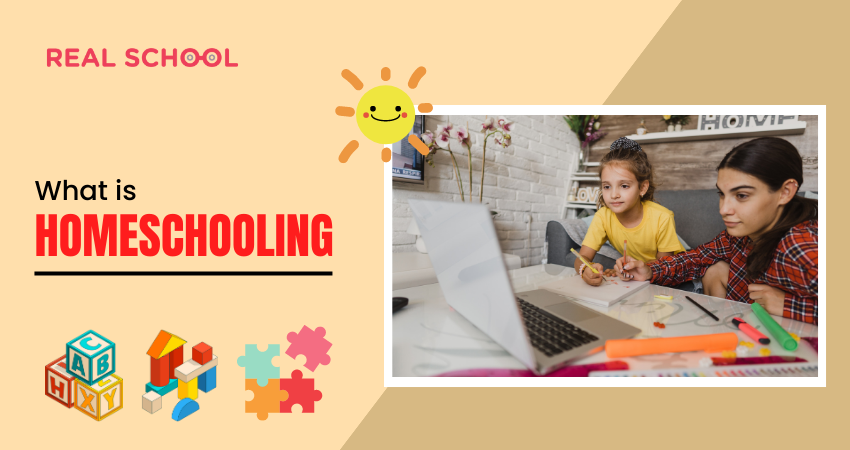What is Homeschooling


Homeschooling is an educational technique in which parents or guardians educate their children at home rather than sending them to a typical public or private school. Parents develop and implement the curriculum, teaching materials, and educational activities for their children while homeschooling, often adhering to the standards and regulations established by their local educational authorities.
Homeschooling can take several forms, depending on the tastes and educational goals of the family. Some families employ structured curriculum and textbooks, while others use a more flexible and child-led approach that emphasizes experiential learning and real-world experiences. Homeschooling can be adapted to a child’s individual learning needs, interests, and learning speed.
It’s crucial to know that homeschooling legislation and standards differ from country to country, and occasionally from state to state or region to state. To verify that their homeschooling program meets the legal requirements for education, parents in many places may be required to meet certain educational standards, keep records of their child’s progress, and follow specified criteria.
History of Homeschooling:
Homeschooling has a long history and was the predominant form of education in many societies before the establishment of formal schools. In modern times, it gained popularity in the 20th century as an alternative to traditional education, with the homeschooling movement growing significantly.
Reasons for Homeschooling:
Families choose homeschooling for various reasons. Some opt for it to provide a more personalized and flexible education tailored to their child’s needs. Others may have concerns about the quality or safety of public or private schools, religious or philosophical beliefs that influence their educational choices, or the desire for more family time and to foster strong parent-child relationships.
Curriculum and Resources:
Homeschooling families have access to a wide range of educational resources, including textbooks, online courses, educational software, and extracurricular activities. They can customize their curriculum to align with their educational goals and the child’s interests.
Also Read: How Homeschooling Works?
Socialization:
Critics of homeschooling sometimes raise concerns about socialization, suggesting that homeschooled children may miss out on opportunities to interact with peers. However, homeschoolers often engage in various social activities, such as sports, clubs, co-op classes, and community events, to ensure that their children have opportunities to socialize and develop social skills.
Legal Requirements:
Homeschooling regulations vary by location. Some places require parents to notify educational authorities, submit curriculum plans, or participate in standardized testing, while others have minimal oversight. It’s crucial for homeschooling parents to be aware of and comply with the legal requirements in their area.
Success and Challenges:
Homeschooling can be highly successful and lead to excellent academic outcomes, but it also comes with challenges. Success often depends on the dedication and commitment of parents, as well as their ability to adapt to their child’s evolving educational needs. Challenges may include time management, curriculum selection, and finding a balance between academics and other activities.
Support Groups:
Many communities have homeschooling support groups or co-op organizations where families can connect, share resources, and collaborate on educational activities. These groups provide valuable social support for both parents and children.
Also Read: How to Create a Montessori Environment at Home
College and Beyond:
Homeschooled students can and do attend college and pursue higher education. Many colleges and universities have admission policies and application processes specifically designed for homeschooled applicants, which often include transcripts, standardized test scores, and letters of recommendation.
Conclusion
In summary, homeschooling is an educational approach that empowers parents to take the lead in their child’s education, offering flexibility, customization, and the opportunity for a unique learning experience. It has grown in popularity as an alternative to traditional schooling, and its success depends on various factors, including parental commitment and adherence to legal requirements. Know more – The Real School
Recent Posts
What are the Advantages of Online Teaching at The Real School?
In the article -"What are the Advantages of Online Teaching at The Real School?" we…
What is the Full Form of School?: Unveiling the Acronym
The term "school" carries profound significance in the realm of education, representing more than just…
What is Math Full Form?: Cracking the Code
Mathematics, often referred to as "Math," is a subject that elicits various reactions from students…
What is Full Form of Homework?: Decoding Academics
Homework, an integral part of the academic journey, often raises questions about its purpose and…
What is Full Form of Teacher?: Demystifying Education
In the intricate tapestry of education, teachers stand as the pillars shaping the intellectual and…
What is Real Education?: Discovering Its Essence and Impact
The concept of real education is evolving, transcending traditional views that equate it solely with…



